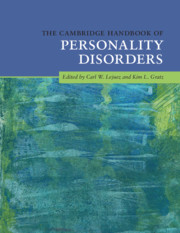Book contents
- The Cambridge Handbook of Personality Disorders
- The Cambridge Handbook of Personality Disorders
- Copyright page
- Contents
- Figures
- Tables
- Contributors
- Preface
- Part I Etiology
- 1 Neuroimaging in Personality Disorders
- 1a A Clinically Relevant Neuroscience for Personality Disorders: Commentary on Neuroimaging in Personality Disorders
- 1b Methodological Advancements Needed in Neuroimaging Research on Personality Disorders: Commentary on Neuroimaging in Personality Disorders
- 1c Illustrating the Value of Neuroimaging Studies Using the Example of Affect Regulation: Author Rejoinder to Commentaries on Neuroimaging in Personality Disorders
- 2 Issues and New Directions in Personality Disorder Genetics
- 2a Four Key Areas for Further Investigation: Commentary on Issues and New Directions in Personality Disorder Genetics
- 2b Highlighting the Value of Dimensional Conceptualizations and Environmental Influences: Commentary on Issues and New Directions in Personality Disorder Genetics
- 2c Questioning Current Directions in Personality Disorder Genetics: Author Rejoinder to Commentaries on Issues and New Directions in Personality Disorder Genetics
- 3 Environmental and Sociocultural Influences on Personality Disorders
- 3a Evidence for Caregiver Factors Proposed by Attachment and Biosocial Theories in the Development of Personality Disorders: Commentary on Environmental and Sociocultural Influences on Personality Disorders
- 3b Towards a Family Process Perspective on Typical and Maladaptive Personality Characteristics: Commentary on Environmental and Sociocultural Influences on Personality Disorders
- 3c Moving Contextual Personality Research Forward: Author Rejoinder to Commentaries on Environmental and Sociocultural Influences on Personality Disorders
- 4 Personality Pathology in Youth
- 4a Toward the Integration of Developmental Psychopathology and Personality Pathology Perspectives: Commentary on Personality Pathology in Youth
- 4b A Developmental Psychopathology Perspective on the Emergence of Antisocial and Borderline Personality Pathologies across the Lifespan: Commentary on Personality Pathology in Youth
- 4c Bridging Diverging Perspectives: Author Rejoinder to Commentaries on Personality Pathology in Youth
- Part II Models
- Part III Individual Disorders and Clusters
- Part IV Assessment
- Part V Treatment
- Index
- References
4b - A Developmental Psychopathology Perspective on the Emergence of Antisocial and Borderline Personality Pathologies across the Lifespan: Commentary on Personality Pathology in Youth
from Part I - Etiology
Published online by Cambridge University Press: 24 February 2020
- The Cambridge Handbook of Personality Disorders
- The Cambridge Handbook of Personality Disorders
- Copyright page
- Contents
- Figures
- Tables
- Contributors
- Preface
- Part I Etiology
- 1 Neuroimaging in Personality Disorders
- 1a A Clinically Relevant Neuroscience for Personality Disorders: Commentary on Neuroimaging in Personality Disorders
- 1b Methodological Advancements Needed in Neuroimaging Research on Personality Disorders: Commentary on Neuroimaging in Personality Disorders
- 1c Illustrating the Value of Neuroimaging Studies Using the Example of Affect Regulation: Author Rejoinder to Commentaries on Neuroimaging in Personality Disorders
- 2 Issues and New Directions in Personality Disorder Genetics
- 2a Four Key Areas for Further Investigation: Commentary on Issues and New Directions in Personality Disorder Genetics
- 2b Highlighting the Value of Dimensional Conceptualizations and Environmental Influences: Commentary on Issues and New Directions in Personality Disorder Genetics
- 2c Questioning Current Directions in Personality Disorder Genetics: Author Rejoinder to Commentaries on Issues and New Directions in Personality Disorder Genetics
- 3 Environmental and Sociocultural Influences on Personality Disorders
- 3a Evidence for Caregiver Factors Proposed by Attachment and Biosocial Theories in the Development of Personality Disorders: Commentary on Environmental and Sociocultural Influences on Personality Disorders
- 3b Towards a Family Process Perspective on Typical and Maladaptive Personality Characteristics: Commentary on Environmental and Sociocultural Influences on Personality Disorders
- 3c Moving Contextual Personality Research Forward: Author Rejoinder to Commentaries on Environmental and Sociocultural Influences on Personality Disorders
- 4 Personality Pathology in Youth
- 4a Toward the Integration of Developmental Psychopathology and Personality Pathology Perspectives: Commentary on Personality Pathology in Youth
- 4b A Developmental Psychopathology Perspective on the Emergence of Antisocial and Borderline Personality Pathologies across the Lifespan: Commentary on Personality Pathology in Youth
- 4c Bridging Diverging Perspectives: Author Rejoinder to Commentaries on Personality Pathology in Youth
- Part II Models
- Part III Individual Disorders and Clusters
- Part IV Assessment
- Part V Treatment
- Index
- References
Summary
Traditionally, studies of personality disorder development have focused on (1) whether adult symptoms are expressed among children and adolescents, and if so (2) ages of onset at which full syndrome criteria are met. Although such studies are necessary and important, they provide limited understanding of etiopathophysiology—the complex and interactive biological and social determinants of PDs across the lifespan. This commentary presents a brief update to our conceptual model of antisocial (ASPD) and borderline (BPD) development among boys and girls. It focuses on (1) complexity of genetic, environmental, and neurohormonal influences on subcortical vulnerability to impulsivity; (2) increasing contributions of cortically mediated emotion dysregulation in adolescence and adulthood; and (3) moderation of common genetic and neural vulnerabilities to ASPD and BPD by sex. Importantly, neural correlates of ASPD and BPD are already observed among teens who are at risk for the disorders. Implications for prevention are discussed.
Keywords
- Type
- Chapter
- Information
- The Cambridge Handbook of Personality Disorders , pp. 94 - 98Publisher: Cambridge University PressPrint publication year: 2020
References
- 6
- Cited by

